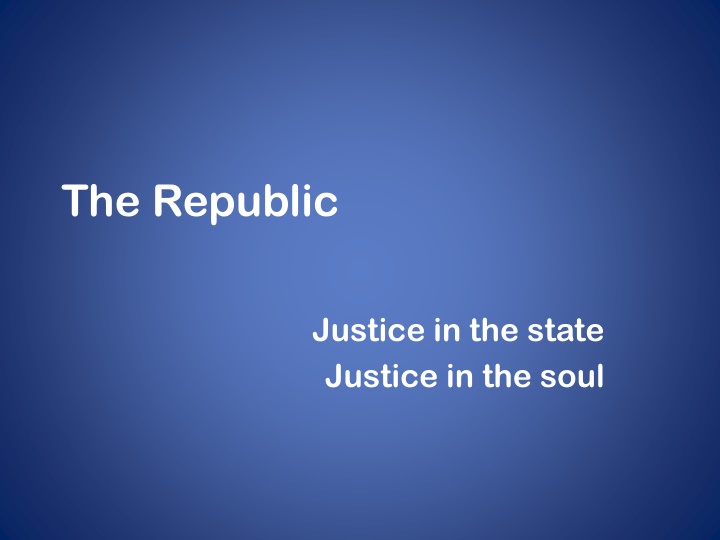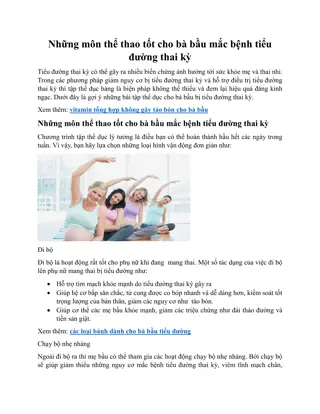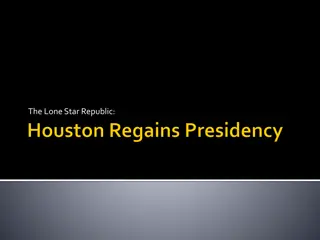
Justice in "The Republic" by Plato
Explore the concept of justice as discussed in Plato's "The Republic," including viewpoints on justice in the state and justice in the soul. Delve into the perspectives of Cephalus, Polemarchus, Thrasymachus, Glaucon, and Adeimantus, as well as the construction of an ideal state and the core elements of the education system envisioned by Socrates.
Download Presentation

Please find below an Image/Link to download the presentation.
The content on the website is provided AS IS for your information and personal use only. It may not be sold, licensed, or shared on other websites without obtaining consent from the author. If you encounter any issues during the download, it is possible that the publisher has removed the file from their server.
You are allowed to download the files provided on this website for personal or commercial use, subject to the condition that they are used lawfully. All files are the property of their respective owners.
The content on the website is provided AS IS for your information and personal use only. It may not be sold, licensed, or shared on other websites without obtaining consent from the author.
E N D
Presentation Transcript
The Republic Justice in the state Justice in the soul
Cephalus and Polemarchus Cephalus: justice is paying off your debts, making sacrifices to the gods Polemarchus: justice is giving each person their due (i.e. helping your friends and harming your enemies Conventional accounts of justice.
Thrasymachus First speech: justice is in the interests of the rulers (description of justice from the position of the ruled) Second speech: injustice is the ruthless pursuit of self-interest, justice is giving others their due (definition of justice) Justice is an exploitative system But we need it Fundamental ideal: admires the man who ruthlessly pursues his own interests.
Glaucon and Adeimantus Prove that justice is good in itself and not only in its consequences.
Constructing the state Socrates tries constructing a state on a basic needs model. Glaucon and Adeimantus aren t happy with this they say it s a city fit for pigs . So Socrates then starts to construct the second society, which also satisfies unnecessary desires. This is a bloated, impure society, with greed and war.
Core of the education system Gymnastics (means all physical pursuits undertaken naked). Intended to develop the thumos (the spirited element). Anything inspired by the artistic Muses (e.g. literature, sculpture, music). Intended to develop the philosophic element. Note: education not for the producer class.
3 classes in ideally just state Guardian class split up after initial military training (Book 3): 1. Rulers (not yet called the philosopher- rulers ) 2. Auxiliary class 3. Producer class Note: the rulers and auxiliaries together form the guardian class.
Social features of the classes Lives of the rulers: Complete separation of power and personal advancement Austere life (live in communes, not allowed any wealth) Food and clothing made for them by the producers Guardians: State mating festivals Children taken away
The function of each class Each class has a function: Rulers Rulers: to rule the state well (state as a whole is wise wise) Auxiliaries Auxiliaries: to implement the decrees of the rulers (state is courageous Producers Producers: to produce and maintain self- control (state is temperate courageous) temperate) Justice Justice underpins these three virtues.
Principle of opposition Socrates Socrates: Clearly, it s a general rule that the same thing won t act or be acted on in opposite ways simultaneously, at any rate in the same respect or in relation to the same thing. So if we do somehow find this happening in the present case, we ll know that it wasn t one and the same thing we were dealing with but more than one (436b-c) Early version of the law of non- contradiction
Illustrating thumos Socrates Socrates: [Leontius] found himself simultaneously wanting to look at them and feeling disgust with himself for doing so, and trying to turn himself away; for a while, it s said, he put up a fight and covered his face, but in the end, overpowered by the desire, he ran up to the corpses, forced his eyes wide open and said, There s a lovely sight for you, you wretches! Take your fill! (439e-440a) Thumos is a socially directed desire
Summary: division of the psyche If reason rules the psyche, the psyche (as a whole) will be wise. If thumos supports, and implements, the dictates of reason, the psyche as a whole will be courageous. If all three parts of the psyche agree that reason should rule and the other two parts should be ruled by reason, the psyche as a whole will exercise self-control. If each aspect of the psyche performs its own proper function, the psyche as a whole will be just.
Does Socrates answer the challenge? Has Socrates so re-worked the notion of justice that he s not actually answered the challenge? Can Socrates show that the person who s soul is in a state of interior psychic harmony won t commit any crimes? And won t be unjust in the more conventional sense?
Socrates Socrates: Justice, therefore, we may say, is a principle of this kind; its real concern is not with external actions, but with a man s inward self, his true concern and interest. The just man will not allow the three elements which make up his inward self to trespass on each other s functions or interfere with each other, but, by keeping all three in tune, like the notes of a scale (high, middle, and low, and any others there be, will in the truest sense set his house to rights, attain self-mastery and order, and live on good terms with himself.
Socrates Socrates: When he has bound these elements into a disciplined and harmonious whole, and so become fully one instead of many, he will be ready for action of any kind, whether it concerns his personal or financial welfare, whether it is political or private; and he will reckon and call any of these actions just and honourable if it contributes to and helps to maintain this disposition of mind, and will call the knowledge which controls such action wisdom. Similarly, he will call unjust any action destructive of this disposition, and the opinions which control such action ignorance (443d-444a).
Socrates Socrates: It must be some kind of civil war between these same three elements, when they interfere with each other and trespass on each other s functions, or when one of them rebels against the whole to get control when it has no business to do so, because its natural role is to be a slave to the rightfully controlling element. This sort of situation, when the elements of the mind are confused and displaced, is what constitutes injustice, indiscipline, cowardice, ignorance and, in short, wickedness of all kinds (444b).
Socrates Socrates: there is an exact analogy between these states of mind and bodily health and sickness Healthy activities produce health, and unhealthy activities produce sickness Well, then, don t just actions produce justice, and unjust actions injustice?...And health is produced by establishing in the mind a similar natural relation of control and subordination among the constituents of the body, disease by establishing an unnatural relation So justice is produced by establishing in the mind a similar natural relation of control and subordination among its constituents, and injustice by establishing an unnatural one It seems, then, that excellence is a kind of mental health or beauty or fitness, and defect a kind of illness or deformity or weakness (444c-e)
Analysis Your flourishing in life is tied to your mental goodness: your flourishing and your moral virtue are the same thing The psyche is far more important than the body Potentially dangerous theory: link between mental health and moral goodness (challenging the state could be interpreted as being mentally ill) Cf. Thrasymachus: separates ar te from eudaimonia






















